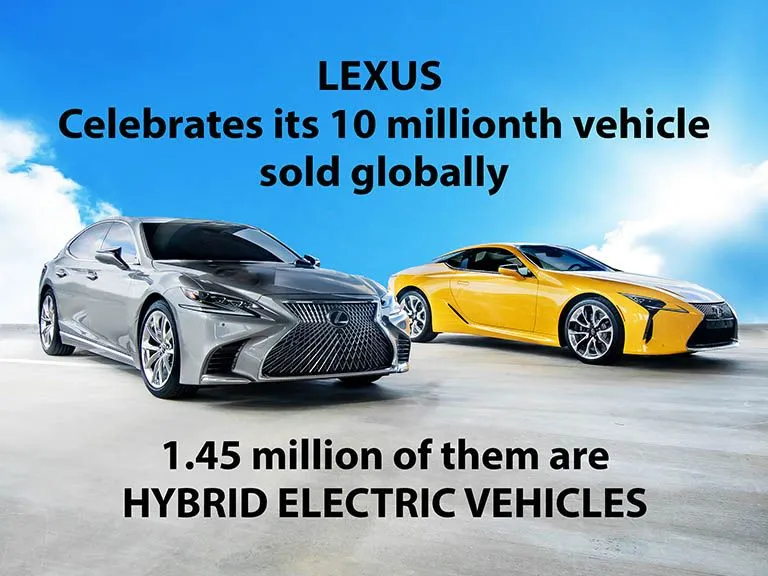
LEXUS sells 10 million vehicles; 1.45 million are self-charging electrified hybrids
Toyota’s Pioneering Brand LEXUS announced in February of 2019 that it had sold its 10 millionth vehicle, a landmark achievement that came shortly after a strong 2018 year-end sales performance with Lexus achieving multiple best-ever sales goals around the globe.
John Coulter, Current EV CMO, July 2019
In addition, the brand that pioneered the world's first luxury hybrid-electric vehicle in 2005, and offers eleven (11) electrified models globally, surpassed the 1.45 million-unit mark in self-charging hybrid vehicles sold worldwide. Lexus hybrid vehicle sales jumped nearly 20% in 2018 from the prior year, a result that underscores the brand's heritage with, and commitment to, electrification.
The brand announced that 698,330 vehicles were sold worldwide during the 2018 calendar year, representing a 4.5% increase over calendar year 2017 (668,515 units). A solid array of luxury utility vehicles such as the RX and NX, the LC and LS flagships, along with the all-new ES and the first-ever UX, combined to lead the global luxury lifestyle brand to its best-ever year of sales.
"Lexus continues to enjoy substantial growth around the world, expanding its footprint in emerging markets as well as reaffirming its strength in established ones. The brand's clear focus on amazing products and guest experiences provided by the finest dealers will support its global growth for years to come," said Lexus International President, Yoshihiro Sawa.
Having launched its Prius Hybrid in Japan in 1997, Toyota has been selling electrified cars for more than two decades now. In the fall of 2015 the automaker announced a number of goals as part of its Environmental Challenge 2050. One of those was to sell 1.5 million hybrids (including its Lexus brand) annually by 2020. Toyota has announced that is has already achieved that goal, selling 1.52 electrified vehicles in 2017.
Other goals of Toyota's Environmental Challenge 2050 are 30,000 annual fuel cell vehicle sales by 2020, mass production of battery electric vehicles in 2020 and annual electrified vehicle sales of 5.5 million by 2030. These are all part of Toyota's larger goal of reducing new vehicle CO2 emissions by 90 percent by 2050 (compared to 2010).
The 6 Challenges that Toyota has given itself are as follows:
1.) Reduce global average CO2 emissions during operation from new vehicles by 90% from Toyota’s 2010 global level
2.) Completely eliminate all CO2 emissions from the entire vehicle life cycle
3.) Achieve ZERO CO2 emissions at all plants by 2050
4.) Minimize water usage and implement water discharge management based on individual local conditions
5.) Promote global deployment of End-of-life vehicle treatment and recycling technologies and systems developed in Japan
6.) Connect nature conservation activities beyond the Toyota Group and its business partners among communities, with the world, to the future.
These are ambitious goals that will prevent hundreds of millions of tons of CO2 from entering the atmosphere. Toyota’s Environmental Challenge 2050 is a benchmark for all other automakers to emulate. The success of its electrified Lexus models is an important part of the automaker’s highly successful progress.
Recent Posts
- The 2022 Audi Q4 e-Tron SUV combines performance, practicality and luxury
- Ford's 2022 F150 Lightning All-Electric Truck is in high demand
- Legendary Audi performance is at the heart of the 2022 Audi e-tron GT and its RS sibling.
- Meet the Lexus RZ 450e – the luxury brand’s 1st EV
- The 2022 GV60 is Genesis’ first all-electric vehicle

